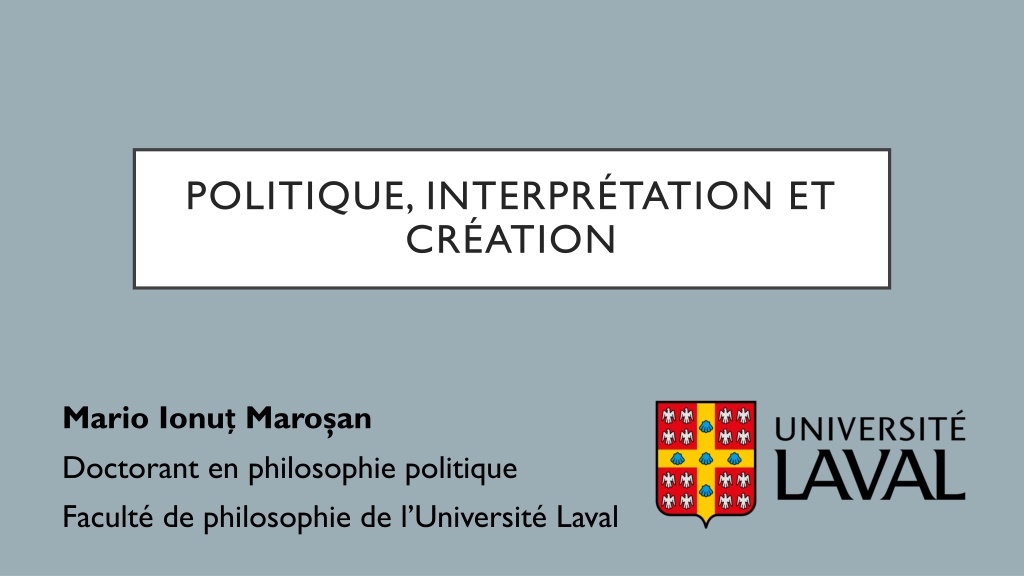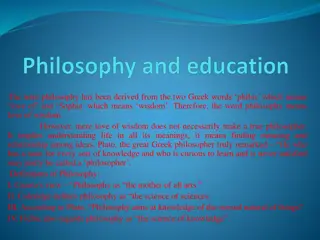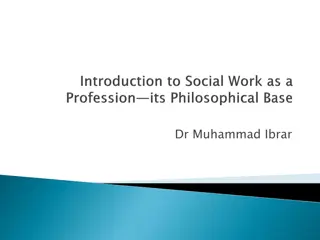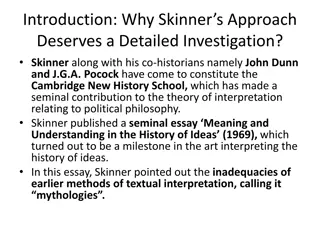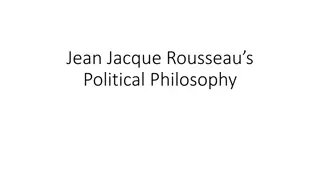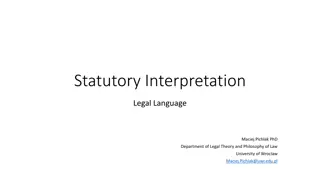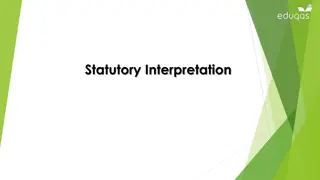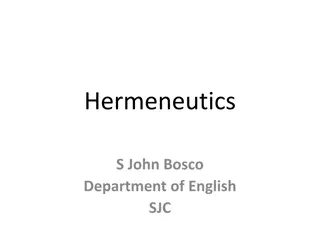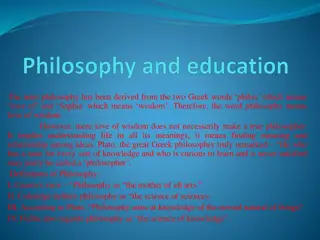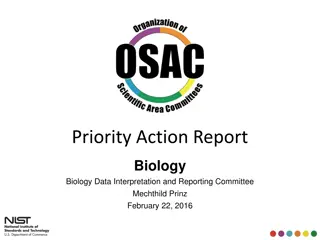Political Philosophy, Interpretation, and Creation
Mario Ionu Maro, a doctoral student in political philosophy at the Université Laval, delves into the complex realms of politics, ethics, and power. Explored within are profound insights from Machiavelli's "The Prince," discussions on the ethical dilemmas of torture in the face of imminent danger, and philosophical musings on the differences between the "foxes" and "hedgehogs" in intellectual and artistic pursuits. These thought-provoking themes challenge conventional notions and invite readers to ponder the intricate interplay of morality, governance, and human nature.
Download Presentation

Please find below an Image/Link to download the presentation.
The content on the website is provided AS IS for your information and personal use only. It may not be sold, licensed, or shared on other websites without obtaining consent from the author. Download presentation by click this link. If you encounter any issues during the download, it is possible that the publisher has removed the file from their server.
E N D
Presentation Transcript
POLITIQUE, INTERPRTATION ET CR ATION Mario Ionu Maro an Doctorant en philosophie politique Facult de philosophie de l Universit Laval
Le prince [le politicien] doit apprendre comment ne pas tre bon . Niccol Machiavelli, Le Prince, chap. XV (1513). When Machiavelli wrote that, he gave powerful articulation to an idea that has become commonplace, namely that we cannot practice politics without dirtying our hands. To attempt otherwise is to court disaster for oneself, of course, but also for one s subjects.
Scnario de la bombe retardement : Les agents du service canadien du renseignement de s curit capturent un terroriste poss dant des informations sur plusieurs bombes cach es qui vont bient t exploser dans plusieurs grandes villes canadiennes et blesser, voire tuer, un grand nombre d individus. Quoi faire alors ? Faut-il autoriser la torture afin d obtenir les informations permettant de d samorcer les bombes ? Or, pour beaucoup de Canadiens la torture constitue une voie erron e. Pour d autres, la responsabilit de protection envers les potentielles victimes innocentes constitue un argument qui p se davantage dans la balance. Que faut-il faire ? Va-t-on avoir les mains sales ou propres en fin de compte ?
' ' , ' (Archiloque, VIIe si cle avant J.-C.) Multa novit vulpes, verum echinus unum magnum ( rasme, 1500) The fox knows many tricks, the hedgehog one, but it s a big one. Il sait bien des tours le renard. Le h risson n en conna t qu un, mais il est fameux. Le renard conna t beaucoup de choses, tandis que le h risson n est connait qu une grande.
For there exists a great chasm between those, on the one side, who relate everything to a single central vision, one system less or more coherent or articulate, in terms of which they understand, think and feel a single, universal, organizing principle in terms of which alone all that they are and say has significance and, on the other side, those who pursue many ends, often unrelated and even contradictory, [ ] related by no moral or aesthetic principle ; [ ] their thought is scattered or diffused, moving on many levels, seizing upon the essence of a vast variety of experiences and objects for what they are in themselves, without, consciously or unconsciously, seeking to fit them into, or exclude them from, any one unchanging, all- embracing [ ] unitary inner vision. The first kind of intellectual and artistic personality belongs to the hedgehogs, the second the foxes; and without insisting on a rigid classification, we may, without too much fear of contradiction, say that, in this sense, Dante belongs to the first category, Shakespeare to the second; Plato, Lucretius, Pascal, Hegel, Dostoevsky, Nietzsche, Ibsen, Proust are, in varying degrees, hedgehogs; Herodotus, Aristotle, Montaigne, Erasmus, Moli re, Goethe, Pushkin, Balzac, Joyce are foxes.
1. Approche moniste des hrissions, qu on pourrait qualifier de th orique. Those sceptical about talk of inescapable dirty hands are all monists. To the orthodox among them, the unity of the practical world, the fact that all values ultimately fit together, means that there always exists a clean solution to every dilemma. To the unorthodox, there may be times when, the world being what it is, we are unable to avoid dirtying our hands; but the world can at least in principle be changed, indeed unified, thereby eliminating the problem of dirty hands.
2. Approche pluraliste des renards, qu on pourrait qualifier de ath orique. Pluralists take the opposite position : to them, the fragmentation of practical reality means that all genuine conflicts are, and always will be, irreconcilable, so the best we can do when faced with one is to strike a compromise, to reach an accommodation that will be more or less dirty.
3. Approche paradoxale de ceux qui affirment simultan ment le pluralisme et le monisme, c est pourquoi on pourrait les qualifier de pluramonistes. We also have those who, paradoxically, combine both pluralism and monism. To the pluramonists, while it s often possible to take a unified and so clean approach, there will be times, indeed a plurality of them, when exceptions must be made and so our hands unavoidably get dirtied.
4. Approche nihiliste. We also have the (often overlooked) nihilists, for whom we should be upholding neither the One, nor the Many, nor a paradoxical combination of the two; rather, what we should recognize is none other than the None. When we do we will see that, given the reality of moral void, anything goes, and that is why there is no need to worry about dirty hands. (le vide)
5. Approche herm neutique, entre pluralisme et monisme. Disons que je me r veille un matin et que je r alise que j'ai deux t ches accomplir : finaliser un article que j'ai accept de soumettre pour publication (il est d j tard, aucune prolongation n'est possible) et tenir une promesse vis- -vis du fait d aider un ami d m nager dans un nouvel appartement.Il me semble que quatre options se pr sentent moi.Je peux aller chez mon ami tout de suite et passer la journ e l'aider d m nager, bien que cela ne me laisse pas le temps de terminer l'article. Je peux partir vers midi et passer la moiti du temps disponible avec mon ami et la moiti avec l'article ni l'un ni l'autre n'obtiendraient leur d , mais ni l'un ni l'autre ne seraient totalement n glig s non plus. Je pourrais aussi aller voir mon ami le soir apr s avoir travaill toute la journ e sur l article mon amiti risque de se finir l . Je peux aussi l ignorer et ne pas terminer l article.Notez qu'une dynamique somme nulle semble ici incontournable, du moins dans les trois premi res options :plus je passe de temps sur l'article,moins j'en ai pour mon ami et vice versa.
5. Approche herm neutique, entre pluralisme et monisme. So the problem is not only with monist theorists who fail to appreciate how enfeebling it is to enshrine values in abstract, hence brittle, principles in order to avoid the slippery slope. Pluralists also fail to realise that, in aiming to do no more than avoiding sliding down that slope, they ensure that our lives will often end up dirtier than they have to be. What could be more dispiriting? We can say the same of the pluramonists, who combine both of these weaknesses in their too-quick appeal to what appears to be no more than irrational creativity (for how else are we to arrive at the plural exceptions to unity?). And that the nihilists demoralize will surprise no one, not least themselves. In consequence, what s needed instead of these and related approaches is a hermeneutical approach (between pluralism and monism), a synergistic ambition, one that strives for reconciliatory solutions. There is no guarantee of success, it is true. But we guarantee failure if we never try.
